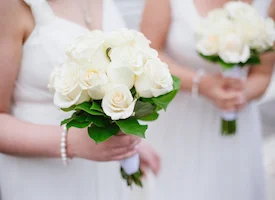I get asked this question all the time by wedding industry vendors: how do I market to gay and lesbian couples?
It's the #1 question I'm asked.
My answer is: start by including photos of gay and lesbian couples on your website and in your other marketing materials.
Instead this photo to the left is what we normally get. (Photo by Teesside, UK) Lots and lots of photos like that - a very attractive couple and they look lovely and happy and they should.
And I'm not saying that you shouldn't include such photos - but it would help your business to show greater diversity in your online portfolio and in your printed materials. If you advertise on a gay wedding directory website or print ad, do not include a photo of a straight couple in your ad!
I try not to be a shameless self-promoter but I do think this is important. I offer a class for those in the wedding industry looking to reach the LGBT marketplace.
The next question I'm asked is: if I've never shot or worked a gay wedding, how do I get photos for my website?
Go through your portfolio and choose some shots of the bride or the groom alone; choose some where the gender may be ambiguous; use ample detail shots and long shots - and for more ideas, look at the photos on this very website, www.GayWeddingInstitute.com.
What's the Difference Between a Straight and a Gay Wedding?
I get this question all the time, "What's the difference between a straight and a gay wedding?" The last person to ask was sweetheart Colin Cowie, whom I met last week at Engage!
I'd be out of business if I couldn't answer it. It's the reason there's demand for a gay wedding producer. Here's a short list of differences:
50% of the country is opposed to gay marriage and many in the wedding industry do not support it either - couples face discrimination.
And it's perfectly legal to discriminate against LGBT couples in 28 U.S. states (i.e. a vendor can say, "I don't want to work with you.")
Who do you think fills the role of the "bride" during a wedding processional, when there are two brides or two grooms? We typically avoid anyone assuming this role by having the couple process together, hand-in-hand, or down two aisles simultaneously...
What do you call an engaged lesbian who doesn't feel like a "bride?"
Just a little food for thought...the list goes on. How do you answer this question?
What’s the ‘Q’ in LGBTQ?
Note: this post first appeared on the WeddingWire EDU blog.
When I’m working with teams training them on attracting LGBTQ customers and growing their client base, my first focus is always language and terminology. I believe that language is the foundation of our society and to effectively serve the LGBT wedding market, we must first truly understand the language of our community.
Let’s start with the easy part: LGBT or sometimes seen as LGBTQ. L stands for lesbian, G for gay, and B for bisexual. All of those are examples of sexual orientation – who we fall in love with, who we are attracted to, and who we want to go to bed with.
The T in LGBT stands for transgender, or someone whose physical body doesn’t match the gender identity in their brain. Those folks are likely to change their bodies to match their minds. The most visible transgender person in the world is probably Caitlyn Jenner, a transwoman, or more accurately, a woman.
And Q stands for queer. Queer is a pretty controversial term, one that has historically been a derogatory term for members of our community. For example the older generation of LGBT folks are often still offended by that term “queer.” They may have been referred to as queer by bullies in high school, college, or even by members of their own family. For them queer is a really controversial and actually offensive term. That’s why I never recommend the use of queer (as a standalone term) in your marketing materials.
However, using LGBTQ as opposed to LGBT is actually a broader term and may be a successful way to market your wedding business. Simply put, queer has actually been reclaimed particularly by Millennials and used as an umbrella term that seeks an understanding of gender and sexual identity as complex and fluid. See, gender is a spectrum. There are lots of people who don’t identify with either male or female boxes, but rather fall somewhere in between. Simply put, they are gender fluid. Another word for gender fluid is genderqueer, commonly shortened as queer.
Similarly there are lots of people who don’t identify as straight, gay or even bisexual. Sexual identity is also a spectrum. If someone has a broad range of attraction to all different kinds of people there’s a very good chance they’re going to self-identify as pansexual or queer. Sometimes I referred to queer as “the anti-label label”: for people who are more fluid and don’t like labels or boxes, it’s the perfect label.
So, why does this matter in the wedding industry? First off, it’s a marketing consideration. Should you use the term LGBT or LGBTQ? If you live in a very liberal place, your client base is currently very progressive liberal couples, and if you often hear from the couple themselves first instead of having parents involved in the planning, then you may consider using LGBTQ instead of LGBT in your marketing materials. LGBTQ is also the perfect term if your target audience is millennial LGBTQ folks. However, if your target audience is older same-sex couples, then I would advise not using LGBTQ and instead just using LGBT. Remember, that older LGBT folks have some baggage around the term queer, particularly if it was used as a slur against them.
Truly, under no circumstances, unless you are part of our community, should you use the word queer on its own. Queer as a standalone term is simply not acceptable because of its history as a derogatory term, and too risky because you may alienate members of the community. For example you should not put on your website “we plan queer weddings.” You should just bear in mind that some couples may self-identify as queer to you.
Additionally, regardless of how someone appears or physically presents themselves, it’s critical that you respect their identity – and if you’re not clear on how to refer to someone, what pronoun to use or how otherwise to identify the person, simply ask. It’s always better to ask than to assume – and until you’re comfortable asking, use their first name without making any other assumptions. You can use a simple statement such as: “As we work together, I want to be sure to treat you with respect. Is there a pronoun you’d feel comfortable with?”
Contemporary couples don’t like boxes, and for those that are LGBTQ, this is particularly true. It’s critical to treat all our clients with respect, and in the LGBTQ community, that starts with a fundamental understanding of the language we use to describe ourselves.
Using Social Media to Attract More LGBTQ Clients
Social media can be a quick and powerful way to attract engaged same-sex couples to your wedding business. However, as with all things social media, it's really important (in fact, critical) to be authentic and to engage in conversation.
The easiest search tool with social media is hashtags. If you go to the website hashtagify.me, you can find out what are some of the most popular LGBT weddings and marriage equality hashtags. If you already have images of LGBT weddings, pin, tweet, instagram and share those images with hashtags such as #loveislove, #lovewins, #marriageequality, #LGBTweddings and similar. Only choose hashtags which feel authentic to you and feel authentic to your voice.
If you don't happen to have any images of same-sex couples, that's fine. Start following other people who do. Find those people by searching some of those hashtags I just named. Follow some of the people who are talking about those topics, then start to re-pin, re-gram, and re-tweet and share their content – making sure to give proper credit and adding your own hashtags, as you see fit.
Social media is a conversation and it can be a very quick way to grow your business with LGBT couples. But above all you must be authentic and use your own voice. To learn more about how social media can help you, download the FREE PDF below.
3 cosas que no sabes sobre las bodas gay que pueden estar danando tu negocio
Día a día, más estados y países están haciendo legales los matrimonios igualitarios y a la par se están haciendo más duras las leyes anti discriminación en todos los aspectos de la vida, desde las escuelas hasta los negocios y es importante como todo esto está afectando tu negocio de bodas y seguramente tú no lo sabes…
1.- Cada vez son más comunes las multas y demandas por discriminación: si por alguna razón decides no prestar tus servicios a una pareja lésbico gay para su boda, lo mejor es que tengas muy claros tus motivos y se los des a conocer. Todo negocio abierto al público tiene la obligación de hacerlo conforme a la Ley y no discriminar no es opcional. Tienes que conocer muy bien la legislación que aplica a tu negocio, adaptar tus políticas, capacitar tu personal, cambiar tus textos, fotos de tu web y redes sociales y estar preparados para atender a todas las parejas que busquen tus servicios.
2.- Si te niegas a hacer bodas igualitarias eso puede no gustarle a tus clientes heterosexuales: la sociedad y las personas están cambiando muy rápido, hoy día nadie quiere ser asociado con marcas o empresas que denigran o discriminan a otros seres humanos, tus clientes heterosexuales también tienen amigos, compañeros y hasta familiares de la comunidad LGBT, así que no adaptarte a los nuevos cambios sociales puede dejarte rápidamente fuera del negocio.
3.- Si no quieres hacer bodas igualitarias tus proveedores y colegas dejarán de recomendarte: y no es amenaza es una realidad. Podemos ser muy buenos en lo que hacemos pero si nuestras actitudes y opiniones dañan a nuestros clientes, colegas y proveedores, lo más seguro es que nadie quiera tomar ese riesgo contigo y terminen por no recomendarte, este es un medio muy pequeño donde personas servimos a otras personas, la calidad humana, la tolerancia y la transparencia son claves para mantener relaciones de negocios largas y prósperas.

